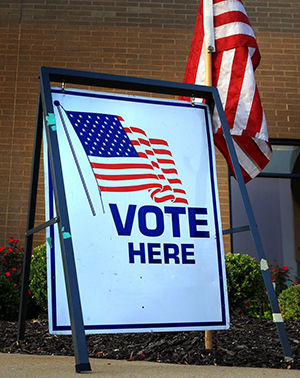Missouri votes for President

The Missouri presidential primary is scheduled to take place Wednesday, March 15. Any registered voter can participate.
The fiercely contested, often chaotic 2016 presidential primary race has been on the minds of many voters throughout the country over the past several months. On Tuesday, March 15, Missourians, along with voters in Illinois, Florida, North Carolina and Ohio will get their turn in the election process when each state holds both their Republican and Democratic primaries.
The major parties’ two front runners – Republican Donald Trump and Democrat Hillary Clinton – each did well on Super Tuesday on March 8, 2016, but not well enough to seal their nominations.
Trump won Hawaii, Michigan, and Mississippi bringing his delegate count to 458, 99 delegates ahead of second place Ted Cruz. Meanwhile, Clinton won big in Mississippi, and lost in stunning fashion to Bernie Sanders in Michigan. Clinton leads Sanders 1221 to 571 in delegates. Tuesday’s primaries could well determine if either of them or both, amass unbeatable leads or fall back.
Missouri is one of 11 states that uses an open primary system, in which registered voters do not have to be members of a party to vote in that party’s primary.
On the Republican side, Missouri’s 52 delegates of the 1,237 needed to win the nomination will go to Trump, Cruz, Marco Rubio, or John Kasich. The Democrats will award 71 of their required 2,383 delegates to either Clinton or Sanders.
“Voting is the way that one’s voice is heard in our Republican form of Democracy,” said Dr. Nicholas P. Nicoletti, assistant professor of political science and assistant director of the Spradling Center for Law and Politics. “Politicians respond to those that vote. This is called the electoral connection. In a republican form of democracy, where we delegate power to elected representatives, our primary means of controlling those representatives is the election.”
If one of the Republican candidates wins more than 50 percent of the vote, an outcome which appears very unlikely, he will take all of Missouri’s 52 delegates. However, if no one cracks that threshold, the GOP delegates will be divvied up based on how candidates perform in each of the state’s eight congressional districts, where the top vote-getter will be awarded five delegates (three Congressional District delegates and two at-large delegates). The top vote-getter statewide would also be awarded 12 delegates.
On the Democratic side, the 71 delegates up for grabs will be divided proportionally based on the overall vote totals. So if a candidate wins 50 percent of the vote, he or she will win half of the delegates.
Several presidential candidates are visiting the state ahead of Tuesday’s election. Donald Trump and Ted Cruz will be in St. Louis this week while former President Bill Clinton will be campaigning for his wife Hillary in St. Louis and Kansas City.
“I didn’t vote during the last election because I was lazy, but I will this time around,” said Erron Holley, senior mass communication major. “I’m not sure who I’m going to vote for yet, but Trump is sounding like a no-go.”
Unlike Holley, some Southern students may not vote in the primary. According to Nicoletti, there are many reasons young people don’t vote.
“Younger individuals have had fewer life events and politics, in their perspective, has less impact on their lives,” he said. “Voting has been shown to be a habit, the more one votes over time, the more likely they are to vote in the future. So good voting habits early in one’s life can lead to higher voter turnout in the future.”
Your donation will support the student journalists of Missouri Southern State University. Your contribution will allow us to purchase equipment and cover our annual website hosting costs.



























